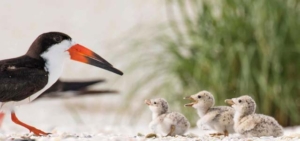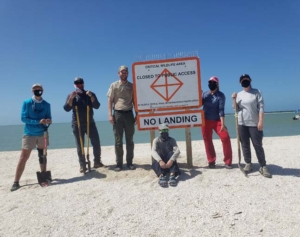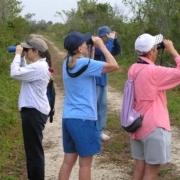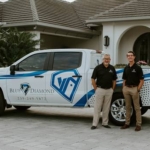Have you seen the Birds at Rookery Bay?
The Many Birds of ROOKERY BAY Research Reserve
Rookery Bay Research Reserve’s 110,000 acres is home to a diverse species of wildlife including a multitude of different types of birds that flourish in the subtropical climate and variety of habitats, everything from hawks such as ospreys and eagles to wading birds like egrets, herons and roseate spoonbills.
 Not only do Reserve researchers and avian biologists monitor these birds that call the Reserve home full-time, they also keep track of many that use Rookery Bay as a stop along the way to rest and feed during their migrations to parts even further south like South America. Birds such as the Red Knot, the tiniest of sandpiper, travel through the Reserve during their long migration from the Arctic Circle to Argentina. The large Northern Gannets (a seabird with a wingspan of 6 feet), are another species of bird that use Rookery Bay as a refuge during migration from Canada each year. Rookery Bay Reserve is truly a place for bird watchers and nature lovers to see all different types of bird life at any time of the year!
Not only do Reserve researchers and avian biologists monitor these birds that call the Reserve home full-time, they also keep track of many that use Rookery Bay as a stop along the way to rest and feed during their migrations to parts even further south like South America. Birds such as the Red Knot, the tiniest of sandpiper, travel through the Reserve during their long migration from the Arctic Circle to Argentina. The large Northern Gannets (a seabird with a wingspan of 6 feet), are another species of bird that use Rookery Bay as a refuge during migration from Canada each year. Rookery Bay Reserve is truly a place for bird watchers and nature lovers to see all different types of bird life at any time of the year!
There is a very special spot in the Reserve where seabirds return each year to nest called Second Chance Island. Located south of Marco Island, this little slip of sand bar has played an important role in the survival of endangered bird species since it was designated a Critical Wildlife Area (CWA) in 2001. Boat landings, shelling, people, dogs and fishing are strictly prohibited on this white sand island from March 1 – August 31.
Each year, Rookery Bay staff and volunteers work together with Florida Fish and Wildlife Conservation Commission (FWC) and Audubon Florida to place closure signs all along this small
stretch of island beach. Over the years, Second Chance has proved a successful breeding location for endangered birds including Least Terns, Black Skimmers and Wilson’s Plovers. It’s remote
location and CWA designation offer these birds that nest out in the wide-open, in the sand and shells a “second chance” to mate and raise their vulnerable chicks on a remote beach, free from
predators and disturbance.
 Check out the birds, wildlife and natural beauty of Rookery Bay Research Reserve this summer with one of our boat or kayak tours or visit the Environmental Learning Center. For hours or to make a reservation for a boat or kayak tour, please visit www.RookeryBay.org
Check out the birds, wildlife and natural beauty of Rookery Bay Research Reserve this summer with one of our boat or kayak tours or visit the Environmental Learning Center. For hours or to make a reservation for a boat or kayak tour, please visit www.RookeryBay.org
Summer Virtual Birding Webinars Take a Break This Summer with Seabirds
Each month this summer, join Rookery Bay’s three avian experts for an online webinar to learn
about the amazing migration journeys of seabirds, their nesting habits and daily lives. You’ll view
birds through a special live-streaming telescope and take virtual tours of some of the best places to see seabirds, from beaches to islands to mudflats!
Online admission: $10.00
Registration is Required at
https://rookerybay.org/#calendar
May 20, 10-10:45am ET
Discover the Littlest Seabirds – The Least Terns
Join Audubon Florida’s Rochelle Streker as she visits a local colony of Least Terns. Least Terns
are the smallest species of tern in the world and nest right here on the beaches of Florida.
June 24, 4-4:45pm ET
The Uncommon Lives of the Common Terns
Catch up with Adam DiNuovo, live from an island, to talk about his experiences living and working with seabirds in the Gulf of Maine. Take a glimpse inside a colony of the small, but mighty Common Terns.
July 29, 7-7:45pm ET
For the love of Black Skimmer Chicks
Join Col Lauzau and Rochelle Streker on Marco Island Critical Wildlife Area as they carefully affix young Black Skimmers birds with individual identification markers (also known as bands). Learn the importance of this practice and how the information gained from banding helps to protect these bird colonies.
August 18, 2-2:45pm ET
Seabirds Tern it Up for the Season Finale
Breeding season is wrapping up, check back in with your favorite seabird biologists as they chat about the successes and lessons learned this summer.





Leave a Reply
Want to join the discussion?Feel free to contribute!